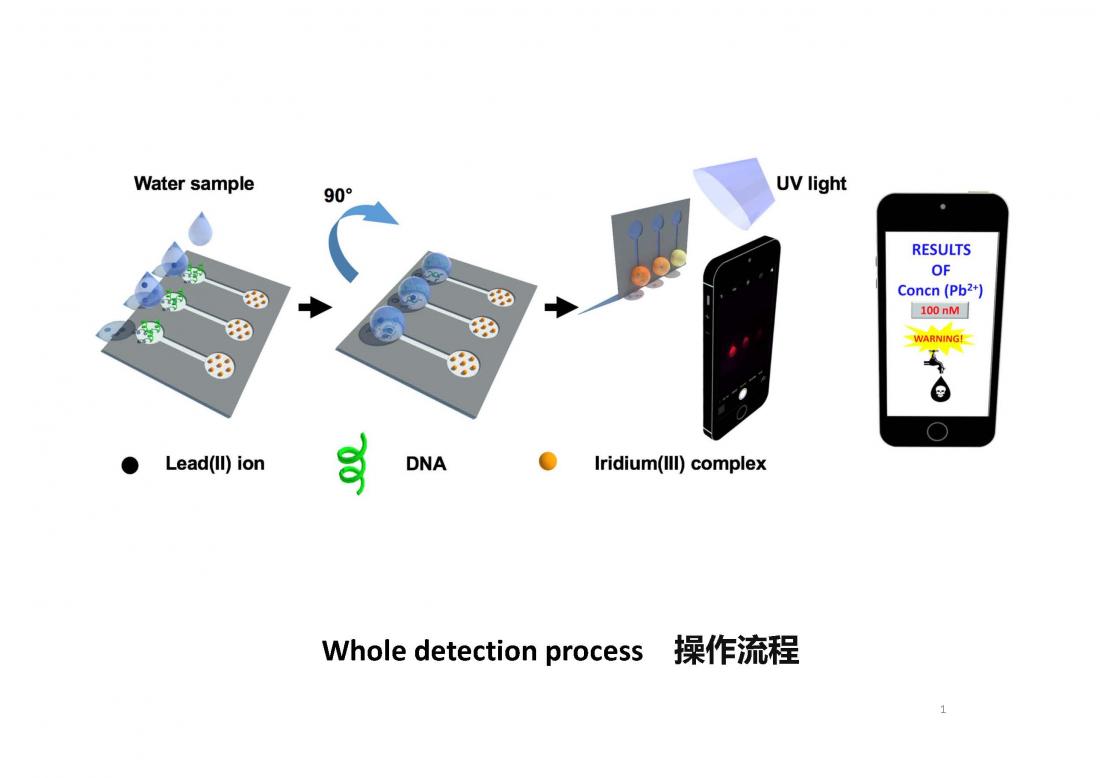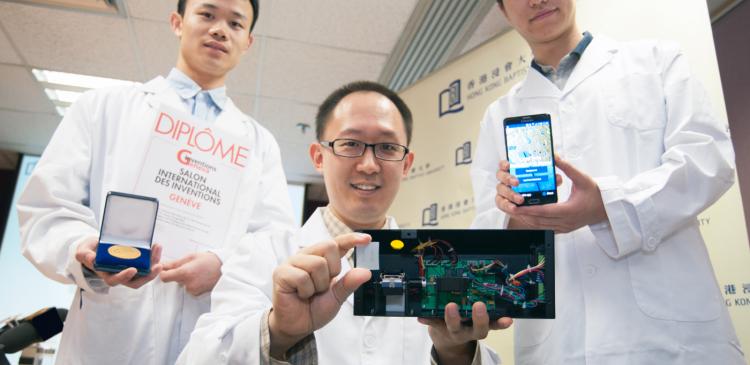The diagram shows the detection process.
The research team from the Department of Chemistry of Hong Kong Baptist University (HKBU) invented a portable device for one-stop detection of lead concentration in drinking water. The DNA-based device which works together with a smartphone can accurately detect lead concentration in less than 10 minutes. This invention won the research team the gold medal at the 46th International Exhibition of Inventions of Geneva held in Switzerland in April 2018. Their invention has been granted a Hong Kong patent and an application for a US patent has been filed.
The detection system requires just a portable device and a smartphone. Compared with traditional detection methods, it is much quicker, lower in cost, simple to use, and highly accurate, sensitive and portable.
The team comprises Assistant Professor Dr Ren Kangning and Associate Professor Dr Edmond Ma of the Department of Chemistry of HKBU; Professor Leung Chung-hang of the Institute of Chinese Medical Sciences of University of Macau; postgraduate student of the HKBU’s Department of Chemistry Sun Han and Research Assistant Mr Zhong Zezhi.
Dr Ren Kangning said that currently the only way for people to check if water is contaminated with lead is by sending the water sample for testing to laboratories equipped with professional machines. This method takes three to four days to get a result and is expensive. The new method invented by the team enables users to check their drinking water by themselves without prior training. A user simply has to take a drop from the sample, put it on the test strip and slide it into the device, then check the signal result (brightness) with a smartphone app.
Dr Ren said, “Our test strip is a plastic microfluidic chip pre-loaded with reagents and probes, hence is simple to operate. The smartphone app compares the signal from the user’s sample with that from the pre-loaded control sample. If the signal from the user’s sample is dimmer than the control sample, the app will indicate that drinking water is safe. And, vice versa, if the signal is brighter, it will indicate that tap water is unsafe to drink.
Dr Ren said, “Lead is a widely known toxic substance which if ingested in excess could lead to child developmental delays, behaviour and learning problems, hearing problems, and kidney damage. Lead contamination in water and soil from industrial and commercial activities, such as mining, metallurgy, printing and dyeing, paint and electronics, can go undetected. Drinking water can get contaminated with lead when the water pipes containing lead corrode. Other sources of lead include brass or chrome-plated brass faucets, older fixtures and the solder that connects pipes. The conventional testing method involves technical laboratory procedures that take time and have a high sensitivity requirement, rendering it impractical for on-site testing. Our new invention overcomes these difficulties.”
Dr Edmond Ma said according to the World Health Organization, every year a large number of people worldwide suffer from lead contamination. In 2013, lead contamination caused as many as 140,000 deaths and 600,000 mental disabilities. In 2015, there were incidents of lead exceeding the safety standard in some drinking water pipelines in Hong Kong.
Dr Ma said the invention not only allows consumers to monitor the safety of drinking water by themselves but can also be used for routine monitoring in industry after wastewater treatment, as well as groundwater and soil testing in the field of agriculture.




